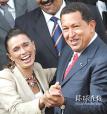Thursday, September 21, 2006
Thursday, September 14, 2006
Sep 14/06 - On the futility of appeasement: Hugo bites!
PMBComment: Richard Lapper, the FT's Latin America editor, has summarized impeccably in the note below what many in
What is ironic is that Latin neighbors as distinct as Presidents Lula, Fox and Uribe have sought to appease Mr. Chávez out of self interest, ignorance, fear or all three factors combined, only to see their efforts rewarded with the treasonous ire of one that seeks to dominate and outlive them all. Mr. Lula got his wiping via
And then there is Mr. Uribe, who comes to
A final reflection: if history is filled with the damage brought upon by dangerous charlatans, why is it that it has proven so difficult to detect and contain them when they pop up anew and why is appeasing them not considered a crime by now? PMB
Financial Times
Chávez is no harmless idealist
By Richard Lapper
Published: September 13 2006 19:56 | Last updated: September 13 2006 19:56
Over the past few months Hugo Chávez has put the most inveterate traveller to shame. One minute the endlessly energetic, anti-American president of Venezuela is in Moscow signing a deal to buy military helicopters and manufacture Kalashnikovs; the next he is in Beijing promising to step up oil sales to China; and then he is in Damascus threatening, alongside Bashar Assad, president of Syria, to "dig the grave of US imperialism".
In between, he finds time to visit assorted African and Asian capitals in order to press his campaign to win one of the temporary seats on the United Nations Security Council. This week he is in
It is still customary for critics, outside
Apologists, such as Luiz Inácio Lula da Silva, the Brazilian president, always draw the distinction between what Mr Chávez says and what he does. "I know that speeches often worry people. But a speech is a speech," Mr Lula da Silva told the Financial Times a couple of months ago. Mr Chávez, after all, they argue, has been democratically elected. The scope for radical action is tempered by harsh economic realities. He may rail about blocking oil sales to the
Unfortunately, this kind of benign interpretation of Mr Chávez and his government is looking a lot less credible.
Once seen as an outlier against a more moderate underlying leftwing trend, Mr Chávez no longer looks so isolated in his region.
Mr Chávez's latest phase of international activism has been accompanied by ever more strident anti-Americanism. Underpinning this is a Manichean view of the world. Listening to him, it seems that
Anyone the American empire opposes is his friend, a stance that explains why he is such a fan of dictators such as Alexander Lukashenko of
Membership of the UN Security Council would offer Mr Chávez another platform. He would not enjoy a veto over the body's decisions. But his style could make the search for the diplomatic middle ground harder. While Europe, Asia and the US grope towards a more consensual, multilateral approach to the complex problems of the Middle East, Mr Chávez or his representatives are likely to grandstand and shoot from the hip, creating conflict and division.
Mr Chávez is unlikely to win the regional consensus that would automatically entitle him to the seat but he could well win the two-thirds majority at next month's general assembly meeting. UN members should turn him down. Countries should not be blinded by their own difficulties with the
In Latin America, moderate leaders such as Mr Lula da Silva and
But they should not – in reaction to that – give encouragement to knee-jerk anti-Americanism.
The writer is the FT's
Copyright The Financial Times Limited 2006
Read more of this PMBComment!

